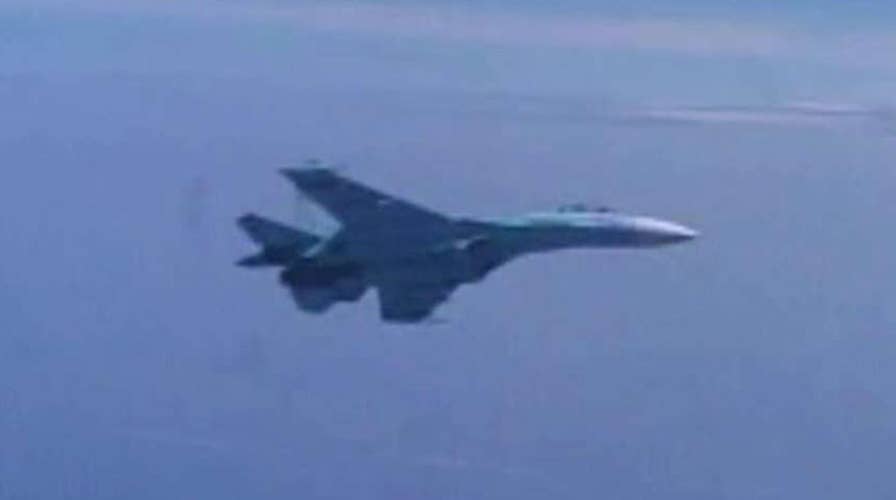Russian fighter jet flies within 20 feet of US Navy aircraft
A U.S. Defense official tells Fox News the jet was armed and the maneuver was provocative; Rich Edson has the details for 'Special Report'
WASHINGTON – The United States asked Russia to be a part of an international effort to address North Korea’s nuclear threat, according to a State Department official. Now, reports from South Korea claim Russian President Vladimir Putin told recently inaugurated South Korean President Moon Jae-in that he is ready to play a “constructive role” in addressing the North Korean threat.
It is unclear what Putin considers constructive and whether that involves coordinating with the United States.
“There are a lot of very significant security problems set across the world, all of them would get easier, right, if Russia were to come to the conclusion that it would best advance its interests through cooperating with the United States and others to resolve those conflicts rather than perpetuate them,” said H.R. McMaster, the White House national security adviser.
NORTH KOREA THREAT: US ‘MONITORING’ CLAIM MISSILE COULD CARRY NUCLEAR WARHEAD
Rhetoric between the U.S. and Russia has recently calmed. One month ago, Secretary of State Rex Tillerson met with Russian President Vladimir Putin in the Kremlin.
“Many of you heard from my trip to Moscow, characterized to President Putin that the relationship between our two nations was the lowest it’s been since the Cold War,” Tillerson said during a May 3 address to State Department employees. “He did not disagree. He shrugged his shoulders and nodded in agreement.”
State Department officials said Tillerson and Russian Foreign Minister Sergey Lavrov now speak about every other week. Last week, Lavrov met President Trump in the Oval office. Presidents Trump and Putin are scheduled to meet this summer at the G-20 Summit in Germany.
Regardless of the more frequent conversations, the U.S. and Russia remain sharply divided on major issues.
Tillerson then said almost no trust exists between the two countries.
Just this past weekend, Putin responded when a North Korea missile landed near Russia. But he was careful not to take sides. He called the missile launch “damaging” and “dangerous,” but then said “intimidating [North Korea] is unacceptable.”
The White House seemed surprised the missile landed so close to Russia. A statement from press secretary Sean Spicer said the president "cannot imagine that Russia is pleased."
WHITE HOUSE: NORTH KOREA HAS BEEN 'FLAGRANT MENACE FOR FAR TOO LONG'
“That dialogue was there under the previous administration,” said Alina Polyakova, the director of research for Europe and Eurasia at the Atlantic Council, of the Obama administration. “I think it failed by all counts to achieve what the administration wanted to achieve at the time: a peaceful settlement in Syria, some progress in the conflict in Ukraine.”
Russia is still backing the Assad regime in Syria and denying election meddling in the U.S. and Europe. It also occupies Crimea and continues its presence in Ukraine.
The U.S. positions on these issues also remain unchanged, according to State Department officials. They said they have relayed that to the Russian government. The U.S., meanwhile, has also been more assertive in Syria.
“Showing the Russians the respect that they really crave while still implementing what is within U.S. national security policy interests at the end of the day, that might actually lead to a productive outcome at the end that would be better than what we’ve seen from multiple previous administrations,” said Polyakova.





















